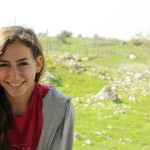My reading
Haftarah Parashat Pinchas
1 Kings 18:46-19:21
18:46 וְיַד־יְהוָ֗ה הָֽיְתָה֙ אֶל־אֵ֣לִיָּ֔הוּ וַיְשַׁנֵּ֖ס מָתְנָ֑יו וַיָּ֙רָץ֙ לִפְנֵ֣י אַחְאָ֔ב עַד־בֹּאֲכָ֖ה יִזְרְעֶֽאלָה׃
19:1 וַיַּגֵּ֤ד אַחְאָב֙ לְאִיזֶ֔בֶל אֵ֛ת כָּל־אֲשֶׁ֥ר עָשָׂ֖ה אֵלִיָּ֑הוּ וְאֵ֨ת כָּל־אֲשֶׁ֥ר הָרַ֛ג אֶת־כָּל־הַנְּבִיאִ֖ים בֶּחָֽרֶב׃
19:2 וַתִּשְׁלַ֤ח אִיזֶ֙בֶל֙ מַלְאָ֔ךְ אֶל־אֵלִיָּ֖הוּ לֵאמֹ֑ר כֹּֽה־יַעֲשׂ֤וּן אֱלֹהִים֙ וְכֹ֣ה יוֹסִפ֔וּן כִּֽי־כָעֵ֤ת מָחָר֙ אָשִׂ֣ים אֶֽת־נַפְשְׁךָ֔ כְּנֶ֖פֶשׁ אַחַ֥ד מֵהֶֽם׃
19:3 וַיַּ֗רְא וַיָּ֙קָם֙ וַיֵּ֣לֶךְ אֶל־נַפְשׁ֔וֹ וַיָּבֹ֕א בְּאֵ֥ר שֶׁ֖בַע אֲשֶׁ֣ר לִֽיהוּדָ֑ה וַיַּנַּ֥ח אֶֽת־נַעֲר֖וֹ שָֽׁם׃
19:4 וְהֽוּא־הָלַ֤ךְ בַּמִּדְבָּר֙ דֶּ֣רֶךְ י֔וֹם וַיָּבֹ֕א וַיֵּ֕שֶׁב תַּ֖חַת רֹ֣תֶם אחת [אֶחָ֑ד] וַיִּשְׁאַ֤ל אֶת־נַפְשׁוֹ֙ לָמ֔וּת וַיֹּ֣אמֶר׀ רַ֗ב עַתָּ֤ה יְהוָה֙ קַ֣ח נַפְשִׁ֔י כִּֽי־לֹא־ט֥וֹב אָנֹכִ֖י מֵאֲבֹתָֽי׃
19:5 וַיִּשְׁכַּב֙ וַיִּישַׁ֔ן תַּ֖חַת רֹ֣תֶם אֶחָ֑ד וְהִנֵּֽה־זֶ֤ה מַלְאָךְ֙ נֹגֵ֣עַ בּ֔וֹ וַיֹּ֥אמֶר ל֖וֹ ק֥וּם אֱכֽוֹל׃
19:6 וַיַּבֵּ֕ט וְהִנֵּ֧ה מְרַאֲשֹׁתָ֛יו עֻגַ֥ת רְצָפִ֖ים וְצַפַּ֣חַת מָ֑יִם וַיֹּ֣אכַל וַיֵּ֔שְׁתְּ וַיָּ֖שָׁב וַיִּשְׁכָּֽב׃
19:7 וַיָּשָׁב֩ מַלְאַ֨ךְ יְהוָ֤ה׀ שֵׁנִית֙ וַיִּגַּע־בּ֔וֹ וַיֹּ֖אמֶר ק֣וּם אֱכֹ֑ל כִּ֛י רַ֥ב מִמְּךָ֖ הַדָּֽרֶךְ׃
19:8 וַיָּ֖קָם וַיֹּ֣אכַל וַיִּשְׁתֶּ֑ה וַיֵּ֜לֶךְ בְּכֹ֣חַ׀ הָאֲכִילָ֣ה הַהִ֗יא אַרְבָּעִ֥ים יוֹם֙ וְאַרְבָּעִ֣ים לַ֔יְלָה עַ֛ד הַ֥ר הָאֱלֹהִ֖ים חֹרֵֽב׃
19:9 וַיָּבֹא־שָׁ֥ם אֶל־הַמְּעָרָ֖ה וַיָּ֣לֶן שָׁ֑ם וְהִנֵּ֤ה דְבַר־יְהוָה֙ אֵלָ֔יו וַיֹּ֣אמֶר ל֔וֹ מַה־לְּךָ֥ פֹ֖ה אֵלִיָּֽהוּ׃
19:10 וַיֹּאמֶר֩ קַנֹּ֨א קִנֵּ֜אתִי לַיהוָ֣ה׀ אֱלֹהֵ֣י צְבָא֗וֹת כִּֽי־עָזְב֤וּ בְרִֽיתְךָ֙ בְּנֵ֣י יִשְׂרָאֵ֔ל אֶת־מִזְבְּחֹתֶ֣יךָ הָרָ֔סוּ וְאֶת־נְבִיאֶ֖יךָ הָרְג֣וּ בֶחָ֑רֶב וָֽאִוָּתֵ֤ר אֲנִי֙ לְבַדִּ֔י וַיְבַקְשׁ֥וּ אֶת־נַפְשִׁ֖י לְקַחְתָּֽהּ׃
19:11 וַיֹּ֗אמֶר צֵ֣א וְעָמַדְתָּ֣ בָהָר֮ לִפְנֵ֣י יְהוָה֒ וְהִנֵּ֧ה יְהוָ֣ה עֹבֵ֗ר וְר֣וּחַ גְּדוֹלָ֡ה וְחָזָ֞ק מְפָרֵק֩ הָרִ֨ים וּמְשַׁבֵּ֤ר סְלָעִים֙ לִפְנֵ֣י יְהוָ֔ה לֹ֥א בָר֖וּחַ יְהוָ֑ה וְאַחַ֤ר הָר֨וּחַ רַ֔עַשׁ לֹ֥א בָרַ֖עַשׁ יְהוָֽה׃
19:12 וְאַחַ֤ר הָרַ֙עַשׁ֙ אֵ֔שׁ לֹ֥א בָאֵ֖שׁ יְהוָ֑ה וְאַחַ֣ר הָאֵ֔שׁ ק֖וֹל דְּמָמָ֥ה דַקָּֽה׃
19:13 וַיְהִ֣י׀ כִּשְׁמֹ֣עַ אֵלִיָּ֗הוּ וַיָּ֤לֶט פָּנָיו֙ בְּאַדַּרְתּ֔וֹ וַיֵּצֵ֕א וַֽיַּעֲמֹ֖ד פֶּ֣תַח הַמְּעָרָ֑ה וְהִנֵּ֤ה אֵלָיו֙ ק֔וֹל וַיֹּ֕אמֶר מַה־לְּךָ֥ פֹ֖ה אֵלִיָּֽהוּ׃
19:14 וַיֹּאמֶר֩ קַנֹּ֨א קִנֵּ֜אתִי לַיהוָ֣ה׀ אֱלֹהֵ֣י צְבָא֗וֹת כִּֽי־עָזְב֤וּ בְרִֽיתְךָ֙ בְּנֵ֣י יִשְׂרָאֵ֔ל אֶת־מִזְבְּחֹתֶ֣יךָ הָרָ֔סוּ וְאֶת־נְבִיאֶ֖יךָ הָרְג֣וּ בֶחָ֑רֶב וָאִוָּתֵ֤ר אֲנִי֙ לְבַדִּ֔י וַיְבַקְשׁ֥וּ אֶת־נַפְשִׁ֖י לְקַחְתָּֽהּ׃
19:15 וַיֹּ֤אמֶר יְהוָה֙ אֵלָ֔יו לֵ֛ךְ שׁ֥וּב לְדַרְכְּךָ֖ מִדְבַּ֣רָה דַמָּ֑שֶׂק וּבָ֗אתָ וּמָשַׁחְתָּ֧ אֶת־חֲזָאֵ֛ל לְמֶ֖לֶךְ עַל־אֲרָֽם׃
19:16 וְאֵת֙ יֵה֣וּא בֶן־נִמְשִׁ֔י תִּמְשַׁ֥ח לְמֶ֖לֶךְ עַל־יִשְׂרָאֵ֑ל וְאֶת־אֱלִישָׁ֤ע בֶּן־שָׁפָט֙ מֵאָבֵ֣ל מְחוֹלָ֔ה תִּמְשַׁ֥ח לְנָבִ֖יא תַּחְתֶּֽיךָ׃
19:17 וְהָיָ֗ה הַנִּמְלָ֛ט מֵחֶ֥רֶב חֲזָאֵ֖ל יָמִ֣ית יֵה֑וּא וְהַנִּמְלָ֛ט מֵחֶ֥רֶב יֵה֖וּא יָמִ֥ית אֱלִישָֽׁע׃
19:18 וְהִשְׁאַרְתִּ֥י בְיִשְׂרָאֵ֖ל שִׁבְעַ֣ת אֲלָפִ֑ים כָּל־הַבִּרְכַּ֗יִם אֲשֶׁ֤ר לֹֽא־כָֽרְעוּ֙ לַבַּ֔עַל וְכָ֨ל־הַפֶּ֔ה אֲשֶׁ֥ר לֹֽא־נָשַׁ֖ק לֽוֹ׃
19:19 וַיֵּ֣לֶךְ מִ֠שָּׁם וַיִּמְצָ֞א אֶת־אֱלִישָׁ֤ע בֶּן־שָׁפָט֙ וְה֣וּא חֹרֵ֔שׁ שְׁנֵים־עָשָׂ֤ר צְמָדִים֙ לְפָנָ֔יו וְה֖וּא בִּשְׁנֵ֣ים הֶעָשָׂ֑ר וַיַּעֲבֹ֤ר אֵלִיָּ֙הוּ֙ אֵלָ֔יו וַיַּשְׁלֵ֥ךְ אַדַּרְתּ֖וֹ אֵלָֽיו׃
19:20 וַיַּעֲזֹ֣ב אֶת־הַבָּקָ֗ר וַיָּ֙רָץ֙ אַחֲרֵ֣י אֵֽלִיָּ֔הוּ וַיֹּ֗אמֶר אֶשְּׁקָה־נָּא֙ לְאָבִ֣י וּלְאִמִּ֔י וְאֵלְכָ֖ה אַחֲרֶ֑יךָ וַיֹּ֤אמֶר לוֹ֙ לֵ֣ךְ שׁ֔וּב כִּ֥י מֶה־עָשִׂ֖יתִי לָֽךְ׃
19:21 וַיָּ֨שָׁב מֵאַחֲרָ֜יו וַיִּקַּ֣ח אֶת־צֶ֧מֶד הַבָּקָ֣ר וַיִּזְבָּחֵ֗הוּ וּבִכְלִ֤י הַבָּקָר֙ בִּשְּׁלָ֣ם הַבָּשָׂ֔ר וַיִּתֵּ֥ן לָעָ֖ם וַיֹּאכֵ֑לוּ וַיָּ֗קָם וַיֵּ֛לֶךְ אַחֲרֵ֥י אֵלִיָּ֖הוּ וַיְשָׁרְתֵֽהוּ׃










